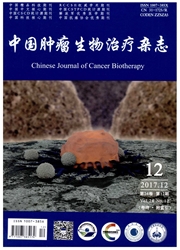

 中文摘要:
中文摘要:
目的:探讨E1A基因对人鼻咽癌CNE2细胞裸鼠移植瘤生长的抑制作用和对放疗的增敏作用及其相关机制。方法:以腺病毒为载体,将E1A基因导人CNE2细胞,获得含EIA的阳性克隆。通过裸鼠致瘤实验,观察E1A基因的抑瘤作用。观察E1A基因疗法及其与放疗联合应用对CNE2细胞裸鼠移植瘤的疗效。RT—PCR法检0n,4E1A基因治疗对P53基因表达的影响。结果:建立稳定转染Ad—E1A的CNE2阳性细胞克隆(CNE2-Ad—E1A),CNE2-Ad-E1A组小鼠细胞移植瘤较CNE2组和CNE2-Ad—B—gal组(稳定转染Ad-β-gal对照质粒的CNE2细胞)成瘤时间晚、肿瘤小。单纯放疗、单纯Ad—E1A基因治疗及Ad—E1A+放疗3种治疗方法均可抑制CNE2裸鼠移植瘤的生长,抑瘤率分别为(60.32±5.34)%、(70.53±6.12)%和(97.15±4.87)%。E1A基因治疗能上调鼻咽癌组织中P53的表达。结论:E1A可抑制人鼻咽癌细胞裸鼠移植瘤的生长并增加其对放疗的敏感性,该作用可能与E1A上调P53基因的表达有关。
 英文摘要:
英文摘要:
Objective:To study the inhibitory effect of E1A gene on the growth of tumors in nude mice implanted with nasopharygeal carcinoma CNE2 cells and its promotion effect on the radiosensitivity of CNE2-implanted tumors, and to investigate the related mechanism. Methods: E1A gene was transfected into CNE2 ceils using adenovirus system, and stable E1A positive clones were established. The inhibitory effect of E1A on tumor formation-ability of CNE2 cells was observed in nude mice. The efficacy of E1A gene therapy with or without radiotherapy against CNE2 cell-implanted tumors was evaluated. The effect of E1A gene therapy on the expression of P53 was detected by RT-PCR. Results: CNE2 cells stably transfected with E1A gene (CNE2-Ad-E1A)were successfully established. The tumor formation time was later and tumor size was smaller in CNE2-Ad-E1A cell-implanted mice compared with those in CNE2 cell- and CNE2-Ad-β-gal cellimplanted mice (CNE2 cells stably transfected with Ad-β-gal). Radiotherapy, E1A gene therapy and E1A gene + radiotherapy all suppressed the growth of implanted tumors, with the tumor suppression rates being (60. 32 ± 5.34)% , (70. 53 ± 6.12)%, and (97.15 ±4.87)% , respectively. E1A gene therapy significantly increased the expression of P53 gene in tumor tissues. Conclusion : E1A can inhibit the growth of tumors in mice implanted with nasopharygeal carcinoma cells, and enhance its sensitivity to radiotherapy, which may be related to the increased expression of P53 gene in tumor tissues.
 同期刊论文项目
同期刊论文项目
 同项目期刊论文
同项目期刊论文
 期刊信息
期刊信息
